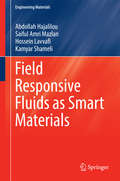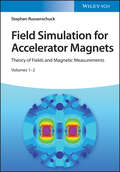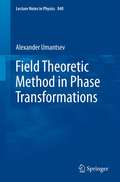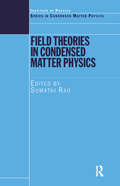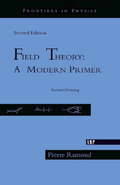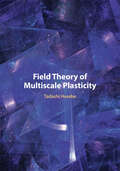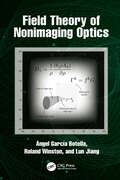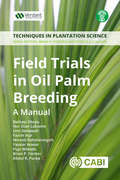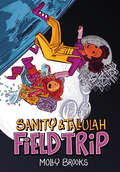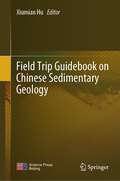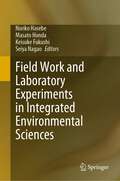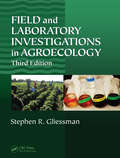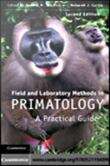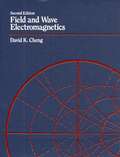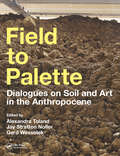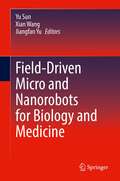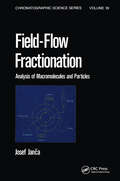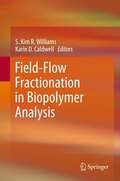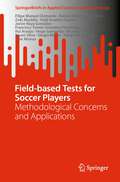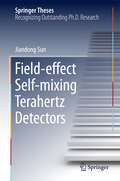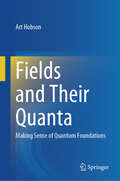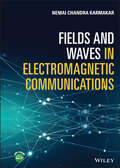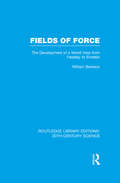- Table View
- List View
Field Responsive Fluids as Smart Materials
by Abdollah Hajalilou Saiful Amri Mazlan Hossein Lavvafi Kamyar ShameliThis book is about field responsive fluids as smart materials, which includes magneto-rheological (MR) fluids, electro-rheological (ER) fluids and ferrofluids. It reviews the previous works and considers all the aspects that can help researchers and industries to choose proper materials as MR fluid constituents. Topics in magnetism and types of magnetic materials are presented. This includes the effect of magnetizable particles behaviors such as size, shape and density. The type of materials on the rheological properties is also compared for MR, ER and ferro-fluids. The second part of the book discusses advanced topics for MR, ER and ferro-fluids comparing some of the properties between the field responsive fluids. This book appeals to engineers, researchers and practitioners in the area of materials and mechanical engineering with interest in the field responsive fluids.
Field Simulation for Accelerator Magnets: Volume 1: Theory of Fields and Magnetic Measurements / Volume 2: Methods for Design and Optimization
by Stephan RussenschuckA comprehensive reference to the theory and practice of accelerator-magnet design and measurement Particle accelerators have many fundamental and applied research applications in physics, materials science, chemistry, and life science. To accelerate electrons or hadrons to the required energy, magnets of highly uniform fields are needed, whose design and optimization are some of the most critical aspects of accelerator construction. Field Simulation for Accelerator Magnets is a comprehensive two-volume reference work on the electromagnetic design of iron- and coil-dominated accelerator magnets and methods of magnetic-field measurements. It provides project engineers and beam physicists with the necessary mathematical foundations for their work. Students of electrical engineering and physics will likewise find much value in these volumes, as the challenges to be met for field quality, electrical integrity, and robustness of accelerator magnets require an in-depth knowledge of electromagnetism. Accelerator-magnet design provides an excellent opportunity to learn mathematical methods and numerical techniques that have wide-ranging applications in industry and science. Readers of the two volumes of this work will find: Authorship by the leading expert on magnetic fields of accelerator magnets Detailed discussion of topics such as vector algebra and analysis, network theory, analytical and numerical field computation, magnetic measurements, elementary beam optics, and many more Application of mathematical optimization techniques, multiphysics simulation, and model-based systems engineering
Field Theoretic Method in Phase Transformations
by Alexander UmantsevThe main subject of the book is the continuum, field theoretic method of study of phase transformations in material systems. The method, also known as "phase field", allows one to analyze different stages of transformations on the unified platform. It has received significant attention in the materials science community recently due to many successes in solving or illuminating important problems. The book will address fundamentals of the method starting from the classical theories of phase transitions, the most important theoretical and computational results, and some of the most advanced recent applications.
Field Theories in Condensed Matter Physics (Condensed Matter Physics)
by Sumathi RaoThe application of field theoretic techniques to problems in condensed matter physics has generated an array of concepts and mathematical techniques to attack a range of problems such as the theory of quantum phase transitions, the quantum Hall effect, and quantum wires. While concepts such as the renormalization group, topology, and bosonization h
Field Theories of Condensed Matter Physics
by Eduardo FradkinPresenting the physics of the most challenging problems in condensed matter using the conceptual framework of quantum field theory, this book is of great interest to physicists in condensed matter and high energy and string theorists, as well as mathematicians. Revised and updated, this second edition features new chapters on the renormalization group, the Luttinger liquid, gauge theory, topological fluids, topological insulators and quantum entanglement. The book begins with the basic concepts and tools, developing them gradually to bring readers to the issues currently faced at the frontiers of research, such as topological phases of matter, quantum and classical critical phenomena, quantum Hall effects and superconductors. Other topics covered include one-dimensional strongly correlated systems, quantum ordered and disordered phases, topological structures in condensed matter and in field theory and fractional statistics.
Field Theory
by Pierre RamondPresents recent advances of perturbative relativistic field theory in a pedagogical and straightforward way. For graduate students who intend to specialize in high-energy physics.
Field Theory of Multiscale Plasticity
by Tadashi HasebeThis unique book provides a concise and systematic treatment of foundational material on dislocations and metallurgy and an up-to-date discussion of multiscale modeling of materials, which ultimately leads to the field theory of multiscale plasticity (FTMP). Unlike conventional continuum models, this approach addresses the evolving inhomogeneities induced by deformation, typically as dislocation substructures like dislocation cells, as well as their interplay at more than one scale. This is an impressively visual text with many and varied examples and viewgraphs. In particular, the book presents a feasible constitutive model applicable to crystal plasticity-based finite element method (FEM) simulations. It will be an invaluable resource, accessible to undergraduate and graduate students as well as researchers in mechanical engineering, solid mechanics, applied physics, mathematics, materials science, and technology.
Field Theory of Non-Equilibrium Systems
by Alex KamenevThe physics of non-equilibrium many-body systems is one of the most rapidly expanding areas of theoretical physics. Traditionally used in the study of laser physics and superconducting kinetics, these techniques have more recently found applications in the study of dynamics of cold atomic gases, mesoscopic and nano-mechanical systems. The book gives a self-contained presentation of the modern functional approach to non-equilibrium field-theoretical methods. They are applied to examples ranging from biophysics to the kinetics of superfluids and superconductors. Its step-by-step treatment gives particular emphasis to the pedagogical aspects, making it ideal as a reference for advanced graduate students and researchers in condensed matter physics.
Field Theory of Nonimaging Optics
by Roland Winston Lun Jiang Angel Garcia-BotellaThis book aims to overcome the traditional ray paradigm and provide an analytical paradigm for Nonimaging Optics based on Field Theory. As a second objective, the authors address the connections between this Field Theory of Nonimaging Optics and other radiative transfer theories. The book introduces the Field Theory of Nonimaging Optics as a new analytical paradigm, not statistical, to analyze problems in the frame of nonimaging geometrical optics, with a formulation based on field theory of irradiance vector D. This new paradigm provides new principles and tools in the optical system design methods, complementary to flowline method, overcoming the classical ray paradigm. This new Field paradigm can be considered as a generalization of the ray paradigm and new accurate and faster computation algorithms will be developed. In a parallel way, the advance in the knowledge of the principles of Field Theory of Nonimaging Optics has produced clear advances in the connection between nonimaging optics and other apparently disconnected theories of radiation transfer. The irradiance vector D can be considered as the macroscopic average of Poynting vector, with a clear connection with radiation pressure. Lorentz geometry techniques can also be applied to study irradiance vector D. There are clear thermodynamic connections between the nonimaging concentrator and Stefan-Boltzmann law of radiation. From this thermodynamic connection, nonimaging optics and irradiance vector D can also be studied from a phase space point of view. This book is intended for researchers, graduate students, academics and professionals looking to analyze, design and optimize optical systems.
Field Trials in Oil Palm Breeding: A Manual (Techniques in Plantation Science #10)
by Brian Forster Umi Setiawati Baihaqi Sitepu Fazrin Nur Abdul R. Purba Miranti Rahmaningsih Yassier Anwar Pujo Widodo Nur D LaksonoThis is a hands-on, practical guide to describe field trials in oil palm breeding. Such trials are essential in almost all breeding programmes to select and verify the real expression of different target traits. In oil palm these include yield, tolerance to pests and diseases, oil quality and adaptability to the environment. Breeding success is dependent upon the genetic resources available and the effectiveness of screening amongst these for the desired traits. Many of these screens can now be carried out in the laboratory, particularly with DNA technologies. However, field trialing remains the "acid test" of commercial performance, with location and statistical design being key. Land preparation and the provision of good quality planting material, usually produced from deliberate cross-pollinations, underly the foundations of these trials. This book covers: Pre-trialing considerations and activities Land preparation Material preparation Trial planting Recording Ganoderma trials Pre-trial screening using DNA diagnostics This is an invaluable manual for oil palm breeders and oil palm institute across the world, and particularly tropical zones. It is also useful for those starting a career in oil palm improvement, those developing breeding programmes, as well as a reference guide for plantation managers and for training purposes.
Field Trip (Sanity & Tallulah #2)
by Molly BrooksSanity and Tallulah are going on a field trip-to a real live planet! Some of their classmates are nervous (none of them have been on a planet before, and they've heard terrible things), but Tallulah is beside herself with excitement. Sanity would be more excited if her grumpy older sister, Prudence, wasn't coming along to supervise the trip. Things get off to a rocky start (asteroid-y start, to be specific) and Sanity and Tallulah find themselves separated from their school group, pursued by a pirate, and stranded on a planet that's about to explode, with nothing but the wreckage of a crashed space shuttle and the contents of Tallulah's overloaded backpack to work with. These best friends will have to stretch their problem-solving skills to the limit in order to get everyone home safe, and it's going to take their whole class-plus an accountant, a math hermit, a group of mysterious beekeepers, and even the murderous pirate-to make it happen.This second adventure in the Sanity & Tallulah series by Molly Brooks is out of this world!
Field Trip Guidebook on Chinese Sedimentary Geology
by Xiumian HuThis book provides diversified and comprehensive sedimentary, stratigraphic, and paleontological information services in China both for scientific research and educational purposes. Although China has the largest number of 11 “golden nails” profiles in the world, few of them has internationally renowned profiles with only traditional sedimentary methods and means for outcrops, logging, and seismic analysis. It combines multiple disciplines such as sedimentology, stratigraphy, paleontology, geophysics, geochemistry, and methods such as big data and artificial intelligence to build open-source online digital platform of geological profiles. Based on the preparation and construction of a number of well-known classic sections of sedimentary geology at home and abroad, it has become an important platform for training of sedimentology talents.
Field Work and Laboratory Experiments in Integrated Environmental Sciences
by Seiya Nagao Noriko Hasebe Masato Honda Keisuke FukushiThis book introduces the variety of research skills necessary for integrated environmental science, which are applicable to atmospheric, oceanic, terrestrial, and biota studies. The surface environment of the earth is a complex system consisting of atmospheric, oceanic, and terrestrial regions as well as the biota therein, all of which interact with one another to various extents. The integration of research disciplines including earth science, biology, chemistry, physics, and social science is a core of environmental science. It encourages students and early-career scientists to take a broad view of the whole environmental system. Detailed practical information for the field or laboratory work in this book helps students and scientists to plan research strategy for their own scope and interests. In addition, this book is also useful for professionals to teach field and laboratory work in environmental science to students. This book is based on the environmental summer school program organized by the Institute of Nature and Environmental Technology, Kanazawa University, in Japan.
Field and Laboratory Investigations in Agroecology
by Stephen R. GliessmanAgroecology is defined as the application of ecological concepts and principles to the design and management of sustainable food systems. Hence, learning can best be achieved through an experiential approach to the topic. Designed to accompany Agroecology: The Ecology of Sustainable Food Systems, Third Edition, Field and Laboratory Investigations i
Field and Laboratory Methods in Primatology
by Joanna M. Setchell Deborah J. CurtisBuilding on the success of the first edition and bringing together contributions from a range of experts in the field, the second edition of this guide to research on wild primates covers the latest advances in the field, including new information on field experiments and measuring behaviour. It provides essential information and advice on the technical and practical aspects of both field and laboratory methods, covering topics such as ethnoprimatology; remote sensing; GPS and radio-tracking; trapping and handling; dietary ecology; and non-invasive genetics and endocrinology. This integrated approach opens up new opportunities to study the behavioural ecology of some of the most endangered primates and to collect information on previously studied populations. Chapters include methodological techniques; instructions on collecting, processing and preserving samples/data for later analysis; ethical considerations; comparative costs; and further reading, making this an invaluable tool for postgraduate students and researchers in primatology, behavioural ecology and zoology.
Field and Wave Electromagnetics
by David ChengRespected for its accuracy, its smooth and logical flow of ideas, and its clear presentation, Field and Wave Electromagnetics has become an established textbook in the field of electromagnetics. <p><p>This book builds the electromagnetic model using an axiomatic approach in steps: first for static electric fields, then for static magnetic fields, and finally for time-varying fields leading to Maxwell’s equations. This approach results in an organized and systematic development of the subject matter. Applications of derived relations to fundamental phenomena and electromagnetic technologies are explained.
Field to Palette: Dialogues on Soil and Art in the Anthropocene
by Alexandra Toland Jay Stratton Noller Gerd WessolekField to Palette: Dialogues on Soil and Art in the Anthropocene is an investigation of the cultural meanings, representations, and values of soil in a time of planetary change. The book offers critical reflections on some of the most challenging environmental problems of our time, including land take, groundwater pollution, desertification, and biodiversity loss. At the same time, the book celebrates diverse forms of resilience in the face of such challenges, beginning with its title as a way of honoring locally controlled food production methods championed by "field to plate" movements worldwide. By focusing on concepts of soil functionality, the book weaves together different disciplinary perspectives in a collection of dialogue texts between artists and scientists, interviews by the editors and invited curators, essays and poems by earth scientists and humanities scholars, soil recipes, maps, and DIY experiments. With contributions from over 100 internationally renowned researchers and practitioners, Field to Palette presents a set of visual methodologies and worldviews that expand our understanding of soil and encourage readers to develop their own interpretations of the ground beneath our feet.
Field-Driven Micro and Nanorobots for Biology and Medicine
by Yu Sun Xian Wang Jiangfan YuThis book describes the substantial progress recently made in the development of micro and nanorobotic systems, utilizing magnetic, optical, acoustic, electrical, and other actuation fields. It covers several areas of micro and nanorobotics including robotics, materials science, and biomedical engineering. Field-Driven Micro and Nanorobots for Biology and Medicine provides readers with fundamental physics at the micro and nano scales, state-of-the-art technical advances in field-driven micro and nanorobots, and applications in biological and biomedical disciplines.
Field-Flow Fractionation (Chromatographic Science Ser.)
by Josef JancaField-flow fractionation has become a very effective method for the separation and analytical characterization of substances of macromolecular and particulate character-making this method probably the most important discovery in the analytical separation field since World War II. The first, complete, up-to-date reference on this notable separation method, Field-Flow Fractionation includes comprehensive explanations of general and theoretical principles . . . presents detailed descriptions of experimental techniques and instrumentation ... and discusses advantages over competitive processes. In addition, this resource demonstrates various applications for characterizing synthetic polymers ... analyzing biopolymers and particles in environmental samples ... and determining sizes of biological cells, viruses, and subcellular particles. Substantiating main conclusions of theories, experiments, and applications with graphs and drawings, and including numerous tables and photographs, this one-source reference is invaluable reading for analytical, industrial, physical, and polymer chemists; chrom atographers; biochemists; biotechnologists; biophysicists; and all others interested in the study and characterization of macromolecules or particles of various origins.
Field-Flow Fractionation in Biopolymer Analysis
by S. Kim Williams Karin D. CaldwellThis is a timely collection of important biomedical applications for a set of separation/characterization techniques that are rapidly gaining popularity due to their wide dynamic range, high resolution, and ability to function in most commonly used solvent systems. Importantly, the field-flow fractionation (FFF) technique has recently emerged as a prominent complement to size exclusion chromatography for protein pharmaceuticals. Fractionation with FFF is gentle and preserves protein structural integrity better than existing alternatives. In the present text, different chapters are written by experts in their respective field of application, who offer comparisons between the FFF techniques and other methods for characterizing their special focus material. Practical guide-lines for successful implementation, such as choice of operating conditions, are offered in conjunction with each application. In addition to new instrumentation and approaches that address important current topics, readers are provided with an overall sense of prior (but timeless) major developments that may be overlooked in literature searches.
Field-based Tests for Soccer Players: Methodological Concerns and Applications (SpringerBriefs in Applied Sciences and Technology)
by Filipe Manuel Clemente José Afonso Hugo Sarmento Bruno Silva Rafael Oliveira Rui Silva Zeki Akyildiz Halil Ibrahim Ceylan Javier Raya González Francisco Tomás Fernández Rui Araújo Ricardo Lima Sérgio Matos Yung-Sheng ChenThis book systematically summarizes the accuracy, precision, and repeatability levels of field-based tests applied in soccer. It considers such details as the effectiveness of tests for different age categories and sexes. In this book, the readers will be able to check all the field-based tests conceived for fitness assessment in soccer through a large systematic review made to the literature. In addition a brief characterization of each test and presentation of the concurrent validity and repeatability levels for each test will be provided. Finally, the book contains a general discussion of the implications of the tests for different methodological approaches to training. It will be use to sports scientists and practitioners.
Field-effect Self-mixing Terahertz Detectors
by Jiandong SunA comprehensive device model considering both spatialdistributions of the terahertz field and the field-effect self-mixing factorhas been constructed for the first time in the thesis. The author has foundthat it is the strongly localized terahertz field induced in a small fractionof the gated electron channel that plays an important role in the highresponsivity. An AlGaN/GaN-based high-electron-mobility transistor with a2-micron-sized gate and integrated dipole antennas has been developed and canoffer a noise-equivalent power as low as 40 pW/Hz1/2 at 900 GHz. By furtherreducing the gate length down to 0. 2 micron, a noise-equivalent power of 6pW/Hz1/2 has been achieved. This thesis provides detailed experimentaltechniques and device simulation for revealing the self-mixing mechanismincluding a scanning probe technique for evaluating the effectiveness ofterahertz antennas. As such, the thesis could be served as a valuableintroduction towards further development of high-sensitivity field-effect terahertzdetectors for practical applications.
Fields and Their Quanta: Making Sense of Quantum Foundations
by Art HobsonBecause of continuing debates about foundational issues as well as the recent consensus about non-locality, it is time to resolve the long-standing quantum enigmas. These include wave-particle duality, the double-slit experiment, quantum randomness, entanglement, superpositions, and measurement. This book presents that resolution, based on the insights that (1) quantum field theory tells us that reality comprises a set of universal quantized fields that fill the universe and (2) standard quantum mechanics is the non-relativistic limit of quantum field theory. An immediate consequence is that there are no particles and that quanta such as photons and electrons are highly unified ("coherent"), spatially extended bundles of field energy. Every quantum object is always a wave in a field. It is never a particle. As Steven Weinberg puts it, "The basic ingredients of nature are fields; particles are derivative phenomena." This immediately resolves, for one example, the puzzle of the double-slit experiment in which quanta such as photons and electrons individually interfere like waves as they pass through the slits yet they impact the screen like tiny particles. The resolution: each photon or electron is actually a wave that extends coherently across both slits and across the entire interference pattern, and collapses to a far smaller, atom-sized wave (not a particle) upon entangling non-locally with the screen. Thus quantum physicists can finally get their act together. It's about time: After more than 120 years, quantum physics still harbors embarrassing puzzles and physicists remain unable to reach a consensus about what the theory means. Large questions like "What is quantum physics about?" and "What is the meaning of the quantum state?" elicit diverse replies, all different yet all offered with supreme confidence. Every science has healthy differences of opinion, but quantum physics is beyond the pale. As Fields and their Quanta shows, we can dispense with the diverse interpretations such as consciousness-based views, the hypothesis that other universes are involved in wave function collapse, and the Copenhagen view that there is no quantum world. We can probably also dispense with the suggested reformulations such as the guiding wave hypothesis and various collapse mechanisms, although experimental tests of these are worth doing. Most of these are inspired by the measurement problem, but recent clarification concerning entanglement and non-locality shows that the measurement process is not paradoxical, and that standard quantum physics predicts collapse to a single outcome. Quantum physics can thus return to being a normal, objective, scientific endeavor with no special interpretation outside of standard (since Copernicus) scientific realism: Nature exists on its own with no need for observers, and we learn about nature by applying logical reasoning to natural phenomena as revealed by observation and experiment.
Fields and Waves in Electromagnetic Communications
by Nemai Chandra KarmakarFIELDS AND WAVES IN ELECTROMAGNETIC COMMUNICATIONS A vital resource that comprehensively covers advanced topics in applied electromagnetics for the professional Electromagnetism (EM) is a highly abstract and complex subject that examines how exerting a force on charged particles is affected by the presence and motion of adjacent particles. The interdependence of the time varying electric and magnetic fields—one producing the other, and vice versa—has allowed researchers to consider them as a single coherent entity: the electromagnetic field. Under this umbrella, students can learn about numerous and varied topics, such as wireless propagation, satellite communications, microwave technology, EM techniques, antennas, and optics, among many others. Fields and Waves in Electromagnetic Communications covers advanced topics in applied electromagnetics for the professional by offering a comprehensive textbook that covers the basics of EM to the most advanced topics such as the classical electron theory of matters, the mechanics model and macroscopic model. Specifically, the book provides a welcome all-in-one source on wireless and guided EM that deals in a wide range of subjects: transmission lines, impedance matching techniques, metallic waveguides, resonators, optical waveguides, optical fibres, antennas, antenna arrays, wireless systems, and electromagnetic compatibility (EMC), and more. The content is supported with innovative pedagogy, the most recent reports and working principles of relevant and contemporary technological developments including applications, specialist software tools, laboratory experiments, and innovative design projects. Fields and Waves in Electromagnetic Communications readers will also find: Multiple practical examples, similes and illustrations of interdisciplinary topics related to wireless and guided electromagnetism Explanations of new topics with support of basic theories connected to real-world contexts and associated applications Sets of technology applications that rely on advanced electromagnetism A series of review questions and drills, end-of-chapter problems, and exercises to help enforce what was learned in each chapter Fields and Waves in Electromagnetic Communications is an ideal textbook for graduate students and senior undergraduates studying telecommunication and wireless communication. It is also a useful resource for industry engineers and members of defense services. Moreover, the book is an excellent non-specialist engineering reference able to be used in other disciplines, such as biomedical engineering, mechatronics, computer science, materials engineering, civil and environmental engineering, physics, network engineering, and wireless services.
Fields of Force: The Development of a World View from Faraday to Einstein. (Routledge Library Editions: 20th Century Science)
by William BerksonThis book describes the picture of reality given by Newton, and the development of the later picture of reality given by field theory. In telling this story, the author explains what problem each scientist faced, and how the process of solving them led to new discoveries. By this method he gives unique insight into the understanding of Einstein’s special theory of relativity, as he explains exactly what problems led to the invention of the theory, and exactly where Einstein’s solution differed from his predecessors’. A similar analysis is given of the discoveries of Faraday, Maxwell, Hertz and Lorentz. The problem-oriented approach of the book, originally published in 1974, enables the reader to share in the original creative process, and in the excitement of the discoveries. It puts physics problems into new perspective and discusses the philosophical implications of the history - an illuminating account of a great episode in the history of thought.
